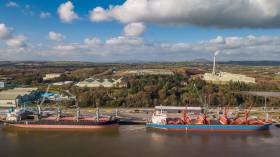Displaying items by tag: Profits: €17m
Port of Waterford Announces Improved 2017 Results
#Ports&Shipping - The Port of Waterford announced details today of its trading results for 2017 and reported operating profits for the financial year of €1.7m
The figure is a significant improvement on the operating performance when compared to €250,000 recorded in 2016.
Turnover was €7.6m (vs €6.3m in the previous year) and shareholder’s funds ended the year at €30.5m.
Bulk throughput came in at just over 1.3m tonnes, a 27% increase on 2016. Containers handled grew by 3% with strong results from project cargo and break bulk activity.
Frank Ronan, Chief Executive, Port of Waterford Co commented: “This has been an excellent trading year for Port of Waterford. Buoyancy in agri markets has driven strong demand for fertiliser and feedstuffs. These factors together with good construction demand and project cargo activity around renewable energy infrastructure has kept us very busy in Belview during 2017.”
2018 indicators
Mr Ronan noted: “Activity during the first quarter of this year is pretty much in line with last year. We anticipate that some lines may not perform quite as strongly in 2018 as they did in 2017 due to market conditions. Having said that, we see some very significant and timely investments going ahead in the Port zone this year that will underpin and drive growth in 2019 and beyond.
On the container handling side, we have not attracted any new services that would provide deep sea connections into the Port. However, we are seeing ongoing growth in our traditional short sea routes serving European markets. Brexit may well provide further opportunities for these load-on/load-off container services that bypass the UK land bridge and provide a very efficient solution for cargo into and out of Europe.”
Masterplan
Capt Darren Doyle, Harbourmaster, confirmed that the estuarial model developed during 2017 is now fully functional and available to support the master planning process that is now underway. He noted that: “This process will evaluate demand, environmental issues, facilities and any required development in a systematic and transparent way. We look forward to ongoing consultation and engagement with our wide range of stakeholders over the next nine months on this issue.”
























































